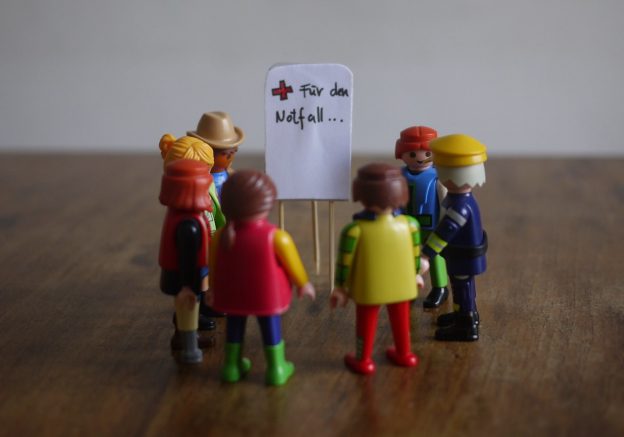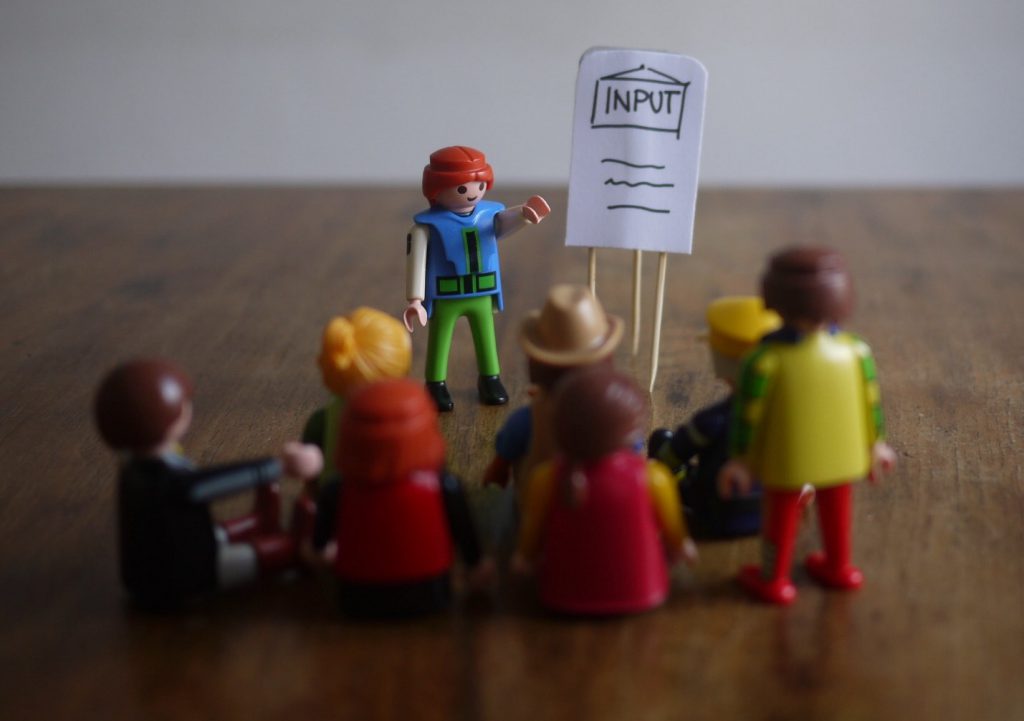
In everyday seminar life, surprises and challenges keep popping up that make even the most seasoned participants stop and think for a moment. At their last meeting before the holidays, our five experts on working with groups will share strategies for contingency plans. They start with a short flash to see how everyone is doing at the moment. To know whose turn it is, they pass a biro from picture to picture. This alone provides amusement in the first few minutes.
Yasemine has taken over the moderation of today’s meeting. Since the group has been meeting online, they have agreed on rules for the meetings: if someone wants to say something, they raise their hand and the person who is moderating asks them to speak. This takes a little longer and requires more discipline, especially for spontaneous ideas, but it ensures that the requests to speak do not overlap.
Difficult co-trainer
Maria and Paul both have a very similar story to tell: During the seminar it gradually became clear that the second trainer had not prepared properly. „I really rolled my eyes inwardly,“ says Maria, „but what are you going to do, you can’t completely embarrass them in front of the group. So I put on a good face and tried to compensate as much as possible. That was one hell of a seminar! I’m sure the group also noticed that we weren’t quite on the same wavelength.“
Paul adds: „Something like that happened to me once. I brought it up during the break. Since then, I try to clarify the working methods and what kind of preparation I expect beforehand. Sometimes that makes a strict impression during the preliminary discussion, but I prefer it to finding out during the seminar that something doesn’t work out.“ Rudi raises his hand: „I once had a co-trainer fall ill at short notice and drop out. Since then, I ask for planned inputs in writing in advance so that I don’t have quite such a hard time improvising if the worst comes to happen.“
Contingency plan:
– Agree on working methods and expectations in advance.
– Make up for deficits during the seminar.
– Address dissatisfaction promptly.
– Have written inputs available in advance.
Work cannot be done in the room
We all know stories of seminar rooms that – despite clarification and assurances – turned out NOT to be seminar rooms: converted inns, „free“ guest rooms with a few improvised chairs in the middle, „fragrant“ party rooms without a flipchart and no possibility of hanging anything on the walls, intense noise and odour nuisance from construction sites outside the window or the kitchen/inn next door where work is being done… There are almost countless examples. The five colleagues outdo each other with ever more absurd experiences. In the end, however, they come up with similar solutions: Sometimes they had no choice but to shrug and try to deal with the situation as constructively as possible. Other times, a change of room or working outdoors was possible, or the setting was changed – e.g. more small groups than plenary – as the spatial possibilities suggested.
Contingency plan:
– Accept it and make the best of it.
– Change the room.
– Work outdoors.
– Adapt the setting, e.g. small groups, triads, dyads, individual work, talking by walking etc.
Irritating individuals
With regard to irritations by individual participants, the experiences of Paul, Beate, Yasemine, Rudi and Maria are quite different: Yasemine tells of a participant with whom she had a personal, somewhat prejudiced history. Paul describes a participant who apparently came to the seminar drunk and was simply not fit to work. Maria once had a participant who, by his mere presence, had completely upset the atmosphere in the room and permanently irritated everyone else. Rudi told of a participant who did not and would not acknowledge his leadership competence, which became apparent through constant questioning of all his suggestions and work assignments. Beate reported about a participant who had not quite got his digestion under control and had developed unpleasant smells.
The others screw up their faces. Beate laughs: „Yes, at first I was quite overwhelmed. Then I just suggested a break. Everyone was happy about the escape.“ The break is voted the clear favourite of the contingency plans. Other strategies shared range from asking people to leave the seminar, to addressing the irritation with the person in question, to ignoring the irritating person as much as possible and just moving on.
Contingency plan:
– Take a break!
– Ignore the person or the irritating behaviour.
– Address the irritation (in front of the group or in an individual conversation).
– Ask them to leave the room.
Prepared technology fails completely
Rudi tells of an experience at an online seminar where the technology failed at the strategically most unfavourable moment. Beate shrugs: „At face-to-face seminars, I have all the slides from a presentation printed out as well. That way, in case of a technical emergency, I can give a presentation without a laptop and beamer and even make small visualisations on the flipchart. But online…“ she looks around a little perplexed. Rudi says, „Well, online you’re just not there when the connection goes down. It’s hard to improvise. I’ve worked out a tactic: I always agree with the groups in advance what the failure medium will be. For example, if nothing works and we can no longer see or hear each other online, I send the group an email or text message. I sort of arrange an alternative meeting place where we can then plan what to do next.“
Contingency plan:
– Choose an alternative medium (flipchart instead of PowerPoint, email instead of online room).
Someone in the group verbally crosses boundaries
„What do you actually do when you have someone in the group who says really inappropriate things, is sexist or makes racist remarks?“
Maria types her question into the chat. Yasmine adds: „That’s when I’m in my element!“ She beams into the camera. „I find that’s often a good hook to talk about the group and its dynamics. I’m almost happy when I have such a polarising person in the seminar. It’s often a bit emotionally charged, but then something goes on at the group level. I do try to get the topic away from the person a bit to avoid stigmatisation, but for a discussion about norms and values in the group, something like that is almost a gift.“ Paul adds that in seminars that focus on technical input, he often uses his authority as a trainer in such cases and finds that such debates/statements miss the point and have no place here.
Contingency plan:
– Pick up on boundary crossings and make them useful for the group.
– Deflect with the authority of the group leader.
Whizz kids are like diet drinks
Yasemine checks her watch. „Ok. We have time for one more example, then our agreed time slot is over.“ The group has set a time limit for the online meetings. Because the meetings themselves require more attention, so this is to avoid overloading. Maria reports again: „I have made the experience that sometimes groups have different expectations of me or the seminar than I can provide. For example, they believe that I will make all their conflicts disappear when I talk about conflict management.“
Paul wants to add something: „… They also believe that I know all their technical terms, or am familiar with their processes.“ Rudi adds without speaking up: „I have the feeling they sometimes think we are miracle workers and are then disappointed when they have to contribute a lot to the issues themselves. We are often only in the role of facilitators – the enablers.“
The others nod. Everyone is familiar with that issue as well. Beate raises her hand: „I usually just bring it up. I know it sounds banal now, but people secretly know that conflicts don’t just disappear, otherwise that would have happened already. It’s like diet drinks: we like to believe it works, but secretly we already suspect it sounds too good to be true.“ The others laugh. The comparison is really apt. Maria says, „I’ll have to remember that, next time the group confronts me with such inflated demands, I’ll bring that to them as an example.“
Contingency plan:
– Find metaphors.
– Make your role clear.
Wishes for 2021
The concentration is slowly coming to an end and the five agree to meet again at the beginning of the new year. At the end, Yasemine asks everyone to choose an object within reach that represents a wish for 2021. In turn, each person holds the object briefly up to the camera and says a sentence about it. After this beautiful and positive outlook into the next year, the experts say goodbye for this year. Happy holidays!
All the examples given are true incidents from the everyday life of holding seminar, which we have collected.
Authors: Gerda Kolb and Irene Zavarsky
Lust auf mehr? Zu allen Beiträgen der Serie kommst du HIER!

Dieses Werk ist lizenziert unter einer Creative Commons Namensnennung-NichtKommerziell-Weitergabe unter gleichen Bedingungen unter gleichen Bedingungen 3.0 Österreich Lizenz.
Volltext der Lizenz



